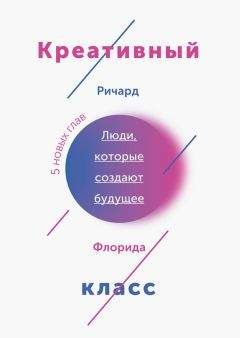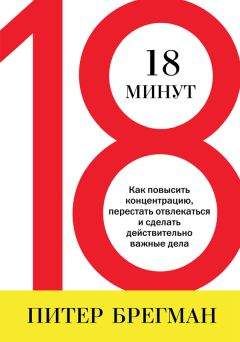Ричард convertfileonline.com - _2016_02_09_21_40_03_404

Скачивание начинается... Если скачивание не началось автоматически, пожалуйста нажмите на эту ссылку.
Жалоба
Напишите нам, и мы в срочном порядке примем меры.
Описание книги "_2016_02_09_21_40_03_404"
Описание и краткое содержание "_2016_02_09_21_40_03_404" читать бесплатно онлайн.
[28] Peter Drucker, Post-Capitalist Society. New York: Harper Business, 1993, quote from p. 8; см. также: “Beyond the Information Revolution,” Atlantic Monthly 284 (4) (October 1999): 47–57; “The Next Society,” Economist, November 1, 2001 (Economist Survey), pp. 1–20. Считается, что первым этот термин использовал Фриц Махлуп в книге, опубликованной в 1962 году: Fritz Machlup, The Production and Distribution of Knowledge in the United States. Princeton: Princeton University Press, 1962 (издана на русском языке: Махлуп Ф. Производство и распространение знаний в США. М. : Прогресс, 1966). Об экономике знаний писали и многие другие авторы, в том числе: Ikujiro Nonaka and Hiroetaka Takeuchi, The Knowledge Creating Company: How Japanese Companies Create the Dynamics of Innovation. New York: Oxford University Press, 1995; Alan Burton Jones, Knowledge Capitalism: Business, Work and Learning in the New Economy. Oxford: Oxford University Press, 1999. Стивен Бринт приводит исчерпывающий анализ этой темы в своей статье: Steven Brint, “Professionals and the Knowledge Economy: Rethinking the Theory of the Postindustrial Society,” Current Sociology 49 (1) (July 2001): 101–132.
[29] “The Creative Economy,” Business Week, special double issue: The 21st Century Corporation, Business Week Online, August 28, 2000, pp. 1–5.
[30] John Howkins, The Creative Economy. New York: Allen Lane, Penguin Press, 2001. Имеется также интересный доклад по этой теме, в котором используется термин «креативная экономика»: “The Creative Economy Initiative,” by the New England Council, June 2000. Однако в этом отчете определение креативной экономики ограничено художественной и культурной областями.
[31] Другие авторы тоже писали об экономике интеллектуального капитала; см., например: Thomas A. Stewart, Intellectual Capital: The New Wealth of Organizations. New York: Doubleday/Currency, 1997; Leif Edvinsson and Michael S. Malone, Intellectual Capital: Realizing Your Company’s True Value by Knowing Its Hidden Brainpower. New York: Harper-Collins, 1997.
[32] Существует много исследований о роли знаний и интеллекта на производстве. См., например: Shoshana Zuboff, In the Age of the Smart Machine: The Future of Work and Power. New York: Perseus Books, 1989; Dorothy Leonard-Barton, Wellsprings of Knowledge: Building and Sustaining the Sources of Innovation. Boston: Harvard Business School Press, 1995; James Womack, Daniel Jones, and Daniel Roos, The Machine That Changed the World. New York: Rawson/Macmillan, 1990; Michael Dertouzos, Richard Lester, and Robert Solow, Made in America: Regaining the Productive Edge. Cambridge: MIT Press, 1989; Richard Lester, The Productive Edge: How U.S. Industries Are Pointing the Way to a New Era of Economic Growth. New York: W.W. Norton, 1998.
[33] См.: Martin Kenney and Richard Florida, Beyond Mass Production: The Japanese System and Its Transfer to the United States. New York: Oxford University Press, 1993. On environmental innovation, see Richard Florida and Derek Davison, “Gaining from Green: Environmental Management Systems Inside and Outside the Factory,” California Management Review 43 (3) (Spring 2001): 64—84; and Richard Florida, “Lean and Green: The Move to Environmentally-Conscious Manufacturing,” California Management Review 39 (1) (Fall 1996): 80–105.
[34] Визит в рамках исследований и личные интервью автора.
[35] Zuboff, In the Age of the Smart Machine; см. также Joanne Gordon, “The Hands-on, Logged-on Worker,” Forbes, October 30, 2000, pp. 136–142.
Глава 3
[1] См.: Daniel Bell, The Coming of Post-Industrial Society. New York: Basic Books, 1973; Peter Drucker, The Age of Discontinuity. New York: HarperCollins, 1969 (издана на русском языке: Друкер П. Эпоха разрыва. Ориентиры для нашего меняющегося общества. М. : Вильямс, 2007); Peter Drucker, Post-Capitalist Society. New York: Harper Business, 199; Fritz Machlup, The Production and Distribution of Knowledge in the United States. Princeton: Princeton University Press, 1962; Erik Olin Wright, Classes. London: Verso, 1990, Class Counts. Cambridge, England: Cambridge University Press, 199); Class Crisis and the State. London: Verso, paperback reissue, 1996.
[2] Robert Reich, The Work of Nations. New York: Alfred A. Knopf, 1991.
[3] Paul Fussell, Class: A Guide Through the American Status System. New York: Summit, 1983.
[4] Steven Barley, The New World of Work. London: British North American Committee, 1996, p. 7.
[5] Steven Brint, “Professionals and the Knowledge Economy: Rethinking the Theory of the Postindustrial Society,” Current Sociology 49 (1) (July 2001): 101–132.
[6] David Brooks, Bobos in Paradise: The New Upper Class and How They Got There. New York: Simon and Schuster, 2000 (издана на русском языке: Брукс Д. Бобо в раю. Откуда берется новая элита. М. : Ад Маргинем, 2013).
[7] Цит. по: Steve Shuklian, “Marx, Dewey, and the Instrumentalist Approach to Political Economy,” Journal of Economic Issues (September 1995): 781–805.
[8] Barley, The New World of Work.
[9] Edward L. Glaeser, “Review of Richard Florida’s The Rise of the Creative Class,” Regional Science and Urban Economics 35 (5) (2005): 593–596.
[10] По данным анализа Шарлотты Мелландер, коэффициент корреляции довольно высокий — 0,77.
[11] Kevin Stolarick and Elizabeth Currid-Halkett, “Creativity and the Crisis: The Impact of Creative Workers on Regional Unemployment,” Cities: The International Journal of Urban Policy and Planning, forthcoming 2011.
[12] Ken Robinson, The Element: How Finding Your Passion Changes Everything. London: Penguin Books, 2009 (издана на русском языке: Робинсон К.Призвание. Как найти то, для чего вы созданы, и жить в своей стихии. М. : Манн, Иванов и Фербер, 2010).
[13] Richard Florida, Charlotta Mellander, and Kevin Stolarick, “Inside the Black Box of Regional Development—Human Capital, the Creative Class and Tolerance,” Journal of Economic Geography 8 (5) (2008): 615–649.
[14] Todd Gabe, “The Value of Creativity,” in David Emanuel Andersson, Ake Emanuel Andersson, and Charlotta Mellander, eds., Handbook of Creative Cities. Cheltenham, UK: Edward Elgar, 2011, pp. 128–145.
[15] David McGranahan and Timothy Wojan, “Recasting the Creative Class to Examine Growth Processes in Rural and Urban Counties,” Regional Studies 41 (2) (2007): 197–216.
[16] Есть одна весьма существенная оговорка: они исключили из рассмотрения данные о таких областям деятельности, как здравоохранение, образование и в определенной степени право, тем самым сократив численность креативного класса примерно на 40 процентов.
[17] Matthew Crawford, Shop Class as Soulcraft: An Inquiry into the Value of Work. New York: Penguin, 2009, p. 51.
[18] См. Kristina Bartsch, “The Employment Projections for 2008–2018,” Monthly Labor Review (November 2009): 3–10. В интернете доступно на сайте: www.bls.gov/opub/mlr/2009/11/art1full.pdf.
[19] Barbara Ehrenreich, Nickel and Dimed: On Not Getting By in America. New York: Henry Holt, 2001, 2011.
[20] В 2010 году годовая заработная плата представителей обслуживающего класса составляла в среднем 30 597 долларов, или 41 процент от общего объема заработной платы креативного класса.
[21] См. Hanna Rosin, “The End of Men,” Atlantic (July–August 2010), and online at www.theatlantic.com/magazine/archive/2010/07/the-end-of-men/8135/; and Catherine Rampell, “The Mancession,” New York Times, Economix Blog, August 10, 2009, and online at http://economix.blogs.nytimes.com/2009/08/10/the-mancession/.
[22] См.: Todd Gabe, Richard Florida, and Charlotta Mellander, “The Creative Class and the Crisis,” Martin Prosperity Institute Research Paper, September 2011.
[23] Stolarick and Currid-Halkett, “Creativity and the Crisis.”
[24] Scott Timberg, “The Creative Class Is a Lie,” Salon, at http://entertainment.salon.com/2011/10/01/creative_class_is_a_lie/?source=newsletter.
[25] См. Richard Florida, Charlotta, Mellander, and Karen King, “The Rise of Women in the Creative Class,” University of Toronto, Martin Prosperity Institute Research Report, October 2011; в интернете доступно на сайте: www.martinprosperity.org/research-and-publications/publication/women-in-the-creative-class. См. также “The Gender Wage Gap: 2009,” Institute for Women’s Policy Research, 2009. В интернете можно найти на сайте: http://www.in.gov/icw/files/IWPR_Wage_Gap_study.pdf.
[26] Самый небольшой разрыв в уровне заработной платы имеет место в сфере образования (8700 долларов), в таких областях, как искусство, дизайн, СМИ, индустрия развлечения и спорт (9400 долларов), а также в сфере биологических наук, естествознания и социологии (9800 долларов). Самый большой разрыв — в области управления (23 400 долларов), права (24 300 долларов) и здравоохранения (26 600 долларов); в области здравоохранения женщины составляют более 75 процентов служащих.
[27] См. Ronald Inglehart, “Globalization and Postmodern Values,” Washington Quarterly 23 (1) (Winter 2000): 215–228; The Silent Revolution: Changing Values and Political Styles in Advanced Industrial Society. Princeton: Princeton University Press, 1977; Culture Shift in Advanced Industrial Society. Princeton: Princeton University Press, 1990; Modernization and Postmodernization: Cultural, Economic and Political Change in Forty-Three Societies. Princeton: Princeton University Press, 1997; “Culture and Democracy,” in Lawrence Harrison and Samuel Huntington, eds., Culture Matters: How Values Shape Human Progress. New York: Basic Books, 2000, pp. 80–97.
[28] Эта тема рассматривается в моей книге: The Flight of the Creative Class. New York: Harper, 2007.
[29] См.: Charlotta Mellander, Richard Florida, and Jason Rentfrow, “The Creative Class, Post-Industrialism and the Happiness of Nations,” Cambridge Journal of Regions, Economy and Society (April 2011), в интернете: http://cjres.oxfordjournals.org/content/early/2011/04/05/cjres.rsr006.abstract
[30] Inglehart, “Globalization and Postmodern Values,” p. 225.
[31] Inglehart, “Culture and Democracy,” p. 84.
Глава 4
[1] Todd Gabe, “The Value of Creativity,” in David Emanuel Andersson, Ake Emanuel Andersson, and Charlotta Mellander, eds., Handbook of Creative Cities. Cheltenham, UK: Edward Elgar, 2011, pp. 128–145.
[2] Noreen Malone, “The Kids Are Actually Sort of All Right,” New York, October 16, 2011.
[3] William C. Taylor, “Eric Raymond on Work,” Fast Company (November 1999), p. 200. См. Также: Eric Raymond, The Cathedral and the Bazaar: Musings on Linux and Open Source by an Accidental Revolutionary. Sebastopol, CA: O’Reilly and Associates, 1999.
[4] Peter Drucker, “Beyond the Information Revolution,” Atlantic Monthly 284, October 4, 1999, pp. 47–57, quote from p. 57.
[5] Information Week, Annual Salary Survey, 2000 and 2001.
[6] Из личного интервью автора, лето 2000 года.
[7] Из личного интервью автора, зима 2000 года.
[8] Из личного интервью автора, весна 2000 года.
[9] См. Richard Lloyd, Neo-Bohemia: Art and Commerce in the Postindustrial City. New York: Routledge, 2006.
[10] Laurie Levesque, “Creating New Roles: Understanding Employee Behavior in High Tech Start-Ups,” Academy of Management, Washington, DC, August 2001; and “A Qualitative Study of Organizational Roles in High Tech Start-Up Firms,” Academy of Management, Toronto, 2000.
[11] См. Robert Merton, “Priorities in Scientific Discovery: A Chapter in the Sociology of Science,” American Sociological Review 22 (6) (1957): 635–659; The Sociology of Science. Chicago: University of Chicago Press, 1973.
[12] См. Partha Dasgupta and Paul David, “Information Disclosure and the Economics of Science and Technology,” in G. Feiwel, ed., Arrow and the Ascent of Modern Economic Theory. New York: New York University Press, 1987; “Toward a New Economics of Science,” Research Policy 23 (3) (May 1994): 487–521. См. также: Paula Stephan, “The Economics of Science,” Journal of Economic Literature 34 (1996): 1199–1235.
Подписывайтесь на наши страницы в социальных сетях.
Будьте в курсе последних книжных новинок, комментируйте, обсуждайте. Мы ждём Вас!
Похожие книги на "_2016_02_09_21_40_03_404"
Книги похожие на "_2016_02_09_21_40_03_404" читать онлайн или скачать бесплатно полные версии.
Мы рекомендуем Вам зарегистрироваться либо войти на сайт под своим именем.
Отзывы о "Ричард convertfileonline.com - _2016_02_09_21_40_03_404"
Отзывы читателей о книге "_2016_02_09_21_40_03_404", комментарии и мнения людей о произведении.













